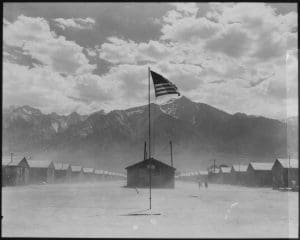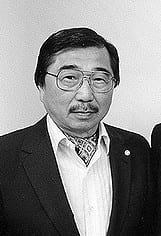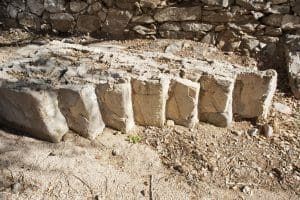This blog post is brought to you by Debbie Q., Joyner-Green Valley Library
February 19, 2022 marks the 80th anniversary of President Franklin D. Roosevelt signing Executive Order 9066, opens a new window [1], which led to the incarceration of over 100,000 Japanese Americans in internment camps across the United States. None of these individuals were ever convicted of treason or wrong doing. On this 80th anniversary, I can’t help but think of Gordon Hirabayashi and his imprisonment during World War II. Gordon’s journey was grounded in his deep sense of justice to correct a wrongful conviction.
Gordon Hirabayashi, opens a new window [2] (b. April 23, 1918 – d. January 2, 2012) was the Nisei (second generation) son of Shungo and Mitsuko Hirabayashi. Gordon’s parents belonged to the Mukyokai, a church that often spoke out about social injustices, believed strongly in pacifism, and believed Christianity was better without formal Western church rituals. These ideals and his parents' faith gave him a desire to live according to his conscience. Gordon was a registered conscientious objector, pacifist, and a Quaker.
When Pearl Harbor was bombed on December 7, 1941, Gordon was at first confident his civil rights would be protected since he was an American citizen. However, Executive Order 9066 specified all persons of Japanese ancestry were to be removed from the West Coast. Since these orders violated his rights as an American citizen, Gordon decided to resist. First, he refused to observe curfew times imposed upon Japanese Americans. When President Roosevelt signed the executive order to relocate all Japanese from the West Coast, Gordon refused to evacuate and turned himself in to the FBI. Gordon’s actions created a test case of the government's right to incarcerate Japanese Americans without due process of law. Despite legal representation through the ACLU, Hirabayashi was found guilty of violating Public Law No. 505 and he was convicted of a federal crime. He entered a plea of "not guilty" on the basis that the exclusion law and curfew were racially prejudiced and unconstitutional. His case was appealed by his lawyers but the conviction was upheld on June 21, 1943.
Once convicted, Mr. Hirabayashi requested to be assigned to a road camp to serve out his sentence. The judge granted his request and he was supposed to serve his 90 day sentence at the Dupont road camp outside Tacoma, Washington. Authorities told Gordon he could not serve his time outside at a roadside camp because the camp was in the military exclusion zone. If he stayed in Washington, he would have to serve his sentence in a jail cell. Instead, Gordon asked if his sentence could be altered so that he could serve time at a road camp outside of the exclusion zone. He was given permission to travel on his own recognizance to the Catalina Federal Honor Camp [3]. Ironically, unbeknownst to the federal judge or Gordon, the Catalina Federal Honor Camp was still within the military exclusion zone. The courts released him to travel on his own to the camp. Hirabayashi hitchhiked for several weeks from Washington to Arizona. He then had to convince the officials at the camp he was reporting to serve his 90 day sentence. The Catalina Federal Prison Camp is now known as the Gordon Hirabayashi Campground [4]. During World War II Gordon and other Japanese Americans were imprisoned in the camp, along with other conscientious objectors to World War II.
In 1987, Gordon’s case was vacated along with the case of Min Yasui, opens a new window [5] through a writ of error coram nobis, opens a new window [6]. Coram nobis is a request to a judge to reopen and reconsider a case that has already been decided. Their cases were based on legal scholar Peter Irons’ discovery the government had knowingly presented false charges of Japanese American disloyalty and espionage.
On the 80th anniversary of this sad day in United States history, let’s remember that we are all humans deserving of dignity, respect and love. History should not repeat itself. Let us see that it never does.
Want to learn more? The Library has plenty to offer!
Sources:
[1] Smithsonian National Museum of American History.” Executive Order 9066”. https://americanhistory.si.edu/righting-wrong-japanese-americans-and-world-war-ii/executive-order-9066
[2] Densho Encyclopedia. “Gordon Hirabayashi”. https://encyclopedia.densho.org/Gordon_Hirabayashi
[3] Densho Encyclopedia. ”Catalina Federal Honor Camp”. https://encyclopedia.densho.org/Tucson_(detention_facility)/
[4] Pima County Public Library “Gordon Hirabayashi Campground”. https://www.library.pima.gov/content/gordon-hirabayashi-campground/
[5] Densho Encyclopedia. “Minoru Yasui”. https://encyclopedia.densho.org/Minoru_Yasui/
[6] NOLO. ”Writ of Coram Nobis.” 2/7/2022. https://www.nolo.com/dictionary/writ-of-coram-nobis-term.html.





